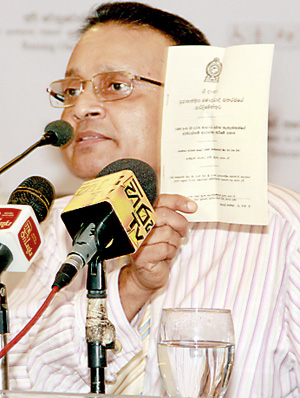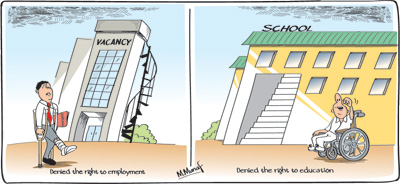Sunday Times 2
Every day of 2016 must be a Human Rights Day

Dr. Ajith Perera - Fighter for the Rights of the Largest Minority
No class of persons should be denied the rights that are enjoyed by others in the same society in like circumstances.
Where is the reality here as it is now one year since the sweet promises we were given of social justice and equality in last year January?
Marginalisation and denial of rights concerning most of the necessities in daily life — such as education, employment and recreation — continue to escalate for the majority of the 20% of Sri Lanka’s population who are experiencing restricted ability — the largest minority of people.
Social, economic, cultural, political and civil rights are teh five birth rights of all human beings, derived from the inherent dignity of the human person.
These rights are universal and inalienable; indivisible; interdependent and interrelated. They are to be enjoyed by everyone for all 365 days!
Participation restrictions
Failure to provide safe and equal access to a facility or equal treatment in a service — such as in tourism — constitutes discrimination.
The right to enjoy access is the single essential pre-requisite right for protection, promotion and enjoyment of all other human rights.
In most cases its denial also poses unwanted threats to personal safety — a crucial issue that is NOT negotiable under any circumstances.
All of us, for different reasons, are certain to spend some of our time living with our mobility and stability restricted.
Often they face considerable barriers — even in reaching the ballot box and thus unable to enjoy the democratic right of franchise.
All people — regardless of the degree of mobility in particular — have the right to participate in the decision-making processes that affect their lives and wellbeing.
Participation restrictions with activity limitations are now recognised internationally as a human rights issue, causing denial of the democratic rights to become equal partners in development programmes.
No government has ever before given any due recognition to this burning human rights issue of national importance — one which also causes colossal waste, both socially and economically, to plague the country in untold proportions.
 Open your eyes
Open your eyes
Evidence shows that when barriers are removed and access is promoted, the entire community benefits and the colossal wastes a country incurs is minimised.
When the ability of a person gets restricted, still, he/she should enjoy the right to equal treatment in accessing all facilities including entrances, toilets and washrooms and services such as those provided by hotels, restaurants, shops, hospitals, places of education, banks, sports stadia, movie theatres.
Businesses have a moral duty, social responsibility and a legal obligation to make their facilities accessible equally to everyone.
Without convenient and safe access complying with design standards to products, facilities and services at business establishments, what genuine customer care and customer satisfaction/delightedness are there?
Understanding dis-Ability
Legislation defines a Person with dis-Ability (often still termed injuriously as Differently-abled) as:
“Any person who, as a result of any restriction in his physical or mental abilities, is unable by himself to ensure for himself, wholly or partly, the necessities of daily life”.
The growing emphasis world over on human rights has now shifted to emphasise that the degree of one’s mobility should never be a fact for marginalisation in attending to the necessities of daily life.
Access and empowerment of people of all abilities, hence, is a crucial subject of national importance. It is the backbone to enjoy almost all rights.
Accessibility is a Human Right in itself. So we need a holistic approach encompassing not only physical but also electronic accessibility and access to services, including information technology (IT).
Root causes are false beliefs along with non-compliance with accessibility regulations No: 1 of 17 October 2006 formed under Act No: 28 of 1996 that received unanimous parliament approval on 20 March 2007 and failure to implement the Supreme Court orders of 2011 April concerning accessibility at public buildings.
This legislation enshrines the principle of equality and social justice.
Accessibility experts — our missing link
Accessibility experts perform a highly specialised job, which is still, under-estimated and unrecognized in Sri Lanka.
Their absence is the root cause for denial of enjoying many a right — the entitlement to use even an ATM machine to withdraw his pension or even to use a toilet with safety at a five star hotel or in a ward of a hospital.
It requires a good in-depth understanding of intricacies backed by adequate practical experience and thorough working knowledge that goes far beyond than what our university courses on architecture and civil engineering teach.
It is not one where standards and specifications can just be read and applied in vital tasks.
Only an experienced Accessibility Expert will know the utmost importance of considering (future) demographics, much more than mere text-book knowledge from building codes.
Proposed plan of action
Many Sri Lankans with restricted ability often are third class citizens facing discrimination, unable to enjoy access to society on an equal basis with others.
But, it is not their impairments but the man-built social environment that renders people dis-Abled. Hence, this trend is reversible.
Following four remedial measures are practical, low cost and an imperative investment.
(1). Amend Article (12.3) of the Constitution
All citizens require the basic protection enshrined in the Constitution to guarantee that no class of persons shall be denied the same rights that are enjoyed by other classes in the same society in like circumstances.
Amendment to Article 12.3 should read as follows:
“No Person shall, on the grounds of race, religion, language, caste, sex, limitation in physical and / or mental ability or any one of such grounds, be subject to any dis-Ability, liability, restriction, marginalisation, safety hazard or condition with regard to access to buildings and also facilities therein the public needs to use in day-to-day life, including shops, hotels, restaurants, banks, hospitals, sports stadia, places of education – employment – recreation – entertainment and worship of his own religion.”
(2). Activate the important dormant legislation
Activate immediately the dormant legislation concerning the empowerment of People of all Abilities; Accessibility Regulations No: (1) of 2006 and Supreme Court Orders of 2011 April under SCFR: 221/2009.
Set up the framework and ensure the law is effectively implemented in society to strengthen the rule of law in Sri Lanka.
(3). Ensure an inclusive Megapolis agenda
Laws must be empowered and enforced and proper plans effectively implemented to ensure that future cities, towns, basic urban infrastructures and; public facilities and services under the new Megapolis agenda, are environmentally accessible and inclusive of all people’s needs, regardless of the degree of ability.
(4). Establish the services of experienced accessibility experts
Politicians and decision makers still believe that architects and engineers in the building construction industry are alone competent enough to ‘break barriers and establish a just society inclusive to all’.
Looking at reality proves that, in most cases, this thinking is a costly blunder and an unwanted hazard to safety.
Absence of the services of experienced accessibility experts is the missing link in Sri Lanka fuelling social exclusion and denial of enjoying several rights.
(Dr. Ajith C. S. Perera, a former senior manager in industry, was left instantly a Paraplegic for life by a fallen way side tree in 1992. Despite this personal adversity he has bounced back to serve humanity as a fervent advocate of design for inclusion and safety – most importantly as a widely experienced and highly competent accessibility advisor and accessor – as has been befittingly recognised by reputed bodies overseas. For further information see http://goo.gl/3FWyW)

